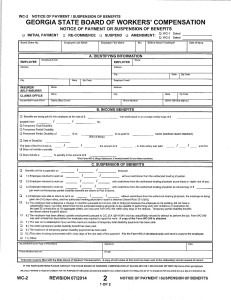A statute of limitations is dangerous. It is a deadline for filing your claim.
If you do not file your claim within the time provided, you will probably lose your case. You will lose your claim without even getting a chance to prove it.
Under the workers’ compensation law in Georgia, there are at least three different statutes of limitation that you need to know about.
- The “All Issues” Statute of Limitations
- The “Change in Condition” Statute of Limitations
- The Medical/Mileage Reimbursement Statute of Limitations
The “All Issues” Statute of Limitations (O.C.G.A. 34-9-82)
This statute of limitations is the most common type. It provides that you have one year from your injury date to file your workers’ compensation claim. If you do not file your claim within one year, then it will be barred.

The one year deadline can be extended. The deadline can be extended if your employer or their workers’ compensation insurance company pays for medical treatment for your injury. It can also be extended if they pay you weekly income benefits in the form of temporary total, temporary partial, or permanent partial disability.
These extensions are tricky though. The safest thing to do is to make sure you file your claim within one year of your injury. Otherwise, you will take a real chance that you could lose your case.
The “Change in Condition” Statute of Limitations (O.C.G.A. 34-9-104)
This statute of limitations is different than most. Most statutes of limitations start when you are injured. This statute starts when you stop receiving temporary total or temporary partial disability benefits.
Once those temporary total or temporary partial benefits stop, you only have two years from that date to request additional temporary total or temporary partial disability benefits. If you do not receive or request those benefits within two years, then you cannot ever receive those benefits again for that work injury.
This statute is especially bad when injured workers return to work. Their temporary total disability benefits usually stop. Then, the statute of limitations starts running.
If they keep working, the statute of limitation can pass by without them even knowing it. When they later need to come out of work because of their injuries, they probably will be barred from receiving benefits.
Often, an injured worker finds out the statute has run when their doctor recommends a surgery that will take them out of owrk. Our firm has seen many cases where an injured worker does not have an attorney and this statute of limitations runs while the injured worker is waiting to get surgery approved.
 The Medical Bill/Mileage Reimbursement Statute of Limitations (O.C.G.A. 34-9-203)
The Medical Bill/Mileage Reimbursement Statute of Limitations (O.C.G.A. 34-9-203)
This statute of limitations provides a deadline for requesting payment of a workers’ compensation medical bill. It also applies to reimbursement of mileage expenses.
Once medical treatment occurs, the bill must be submitted to your employer or workers’ compensation insurance company within one year. If it is not submitted within that time, then the insurance company does not have to pay the bill or reimburse for the mileage expense. So, make sure and submit your reimbursements within one year.
Requirement of Giving Notice of Injury (O.C.G.A. 34-9-80)
This is not technically a statute of limitations, but it has the same effect. The law requires you to give notice to your employer within 30 days of your injury. If you do not, then you could be barred from pursuing your claim.
What If I Miss One of These Deadlines?
It is very important to file your claims for workers’ compensation benefits within the deadlines provided by these statutes of limitations. If you miss these deadlines, you could lose the right to pursue your claim or the right to recover certain types of benefits. The safest thing to do is to make sure that your requests for benefits are filed on time.
If you think you may have missed a deadline, you should know that each of these deadlines has some exceptions. You should consult with an attorney so that he or she can carefully review your case and let you know what options you have and what you need to do.









